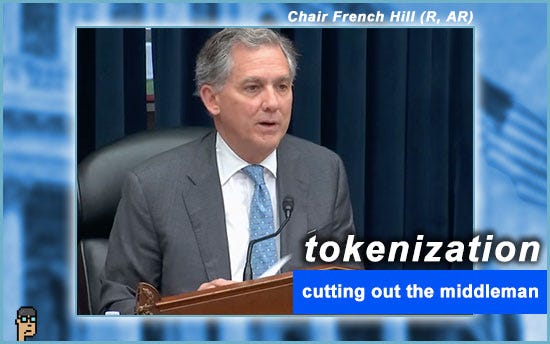Here's My Take on the Congressional Hearings on Tokenization
June 6, 2024 Congressional Hearing Summary on Tokenization
The congressional hearing discussed the tokenization of real-world assets and its implications. Tokenization uses blockchain technology to digitally represent assets, potentially modernizing US markets by reducing costs, increasing transparency, and improving efficiency. The primary focus was on the benefits and challenges of implementing tokenization in various sectors, including finance, banking, and supply chains.
Witnesses' Opinions:
Lily Tesler (Sidley Austin LLP):
Benefits: Highlighted the efficiency, transparency, and programmability of tokenization. Mentioned its potential to improve liquidity and distribution in markets like real estate, food, and pharmaceuticals.
Challenges: Current regulatory guidance lacks clarity and flexibility, creating redundancies and inefficiencies. Tokenized securities face different treatment compared to traditional ones.
Recommendations: Advocated for regulatory consistency, treating tokenized assets like traditional ones, and emphasized collaboration among regulators and industry.
Robert Morgan (USDF Consortium):
Benefits: Tokenization can facilitate faster, cheaper, and programmable payments, improving settlement processes and expanding financial product accessibility. It can help community banks collaborate more effectively.
Challenges: Significant regulatory uncertainty limits banks' adoption of tokenization. The requirement for formal regulatory approval for tokenization projects is a major hurdle.
Recommendations: Suggested eliminating technology-specific approval requirements, providing clear guidance on DLT infrastructure, and promoting public-private partnerships.
Nadine Chakar (DTCC Digital Assets):
Benefits: Tokenization can enhance post-trade processing, increase clearing and settlement efficiency, and improve collateral management.
Challenges: The existing regulatory framework is complex, requiring careful collaboration and coordination among stakeholders.
Recommendations: Supported the alignment of digital asset regulations with existing financial regulations, emphasizing the need for a measured and thoughtful approach.
Carlos Domingo (Securitize):
Benefits: Tokenization can modernize capital markets, particularly private ones, by reducing costs, increasing efficiency, and improving accessibility. Highlighted successful tokenization projects with major asset managers.
Challenges: Existing regulations are not designed for blockchain, creating barriers to the adoption of tokenized securities. The special purpose broker-dealer framework is limited and temporary.
Recommendations: Called for clear definitions of tokenized securities, allowing their custody by broker-dealers, enabling their use on public blockchains, and recognizing blockchain-based transfer agents.
Hilary Allen (American University):
Risks: Warned against integrating tokenization with the crypto industry due to its inherent inefficiencies and operational fragilities. Emphasized the potential risks of fraud, cybersecurity, and financial stability.
Recommendations: Advocated for careful deployment of tokenization to avoid increasing system fragility. Suggested that central bank digital currencies (CBDCs) could serve as a reliable settlement asset, unlike stablecoins.
Congressmen's Opinions:
Chairman Hill:
Supportive: Emphasized the potential of tokenization to modernize markets and reduce costs. Interested in understanding regulatory and legal considerations to facilitate tokenization.
Ranking Member Lynch:
Cautious: Acknowledged the benefits but stressed the risks to consumer protection, privacy, and financial stability. Criticized recent legislation for undermining investor protection laws.
Other Congressmen:
Varied perspectives, with some focusing on the potential efficiencies and others concerned about regulatory gaps and risks.
Opinion on Passing Legislation:
To pass legislation satisfying both the SEC and FINRA, the following approach is recommended:
Clear Definitions: Establish clear definitions distinguishing tokenized securities from other digital assets.
Regulatory Consistency: Ensure tokenized assets are regulated similarly to their traditional counterparts to avoid market confusion and inefficiencies.
Public-Private Collaboration: Foster collaboration between regulators and industry stakeholders to create a robust regulatory framework that supports innovation while protecting investors.
Incentives for Compliance: Provide incentives for financial institutions to adopt tokenization while maintaining strict compliance with AML and KYC regulations.
Addressing Specific Use Cases: Focus on specific, high-impact use cases (e.g., cross-border payments, private securities) to demonstrate the benefits and mitigate risks before broader adoption.
By addressing these key areas, legislation can balance innovation with regulatory oversight, ensuring a secure and efficient implementation of tokenization in the financial system.
🎯AUTHOR BIO 🎯
Meet Mark Fidelman, the tech-savvy founder of SmartBlocks.XYZ, who is making waves in the world of Tradfi using tokenization as his battering ram. With a background in technology sales, marketing, and customer experience, Mark has been instrumental in driving growth for organizations such as NFT leader WAX.io.
P.S. Whenever you're ready, there are 4 ways I can help you:
#1: Ready to tokenize your business, real estate or assets and its $5 million or more? Let's chat. >>> Click here to apply for your call with me
#2: Have you seen my YouTube Channel? I'm putting a ton of energy into creating heaps of valuable content that I think you'll like. Come check out my latest Tokenization Videos, and give me a like and subscribe.
#3: Promote your brand to over 5500 subscribers by sponsoring this newsletter.
#4: Follow me on Twitter and LinkedIn for more operating systems, marketing tips, and community-building systems.





мнения конгрессменов и аналитиков разнятся... блокчейны на смартконтрактах доказывают свою эффективность в токенизации активов, а также гибкость обмена и перевода активов и безопасность активов... нет законодательной базы внедрения криптовалюты и ценных бумаг перспективных проектов, улучшения взаимо расчётов... наряду с цифровыми деньгами которые анонсируют государства, криптовалютные активы должны быть независимы от их вмешательства... надзорный орган над криптовалютными активами должен регулировать взимоотношения между государством и пользователями этих активов...